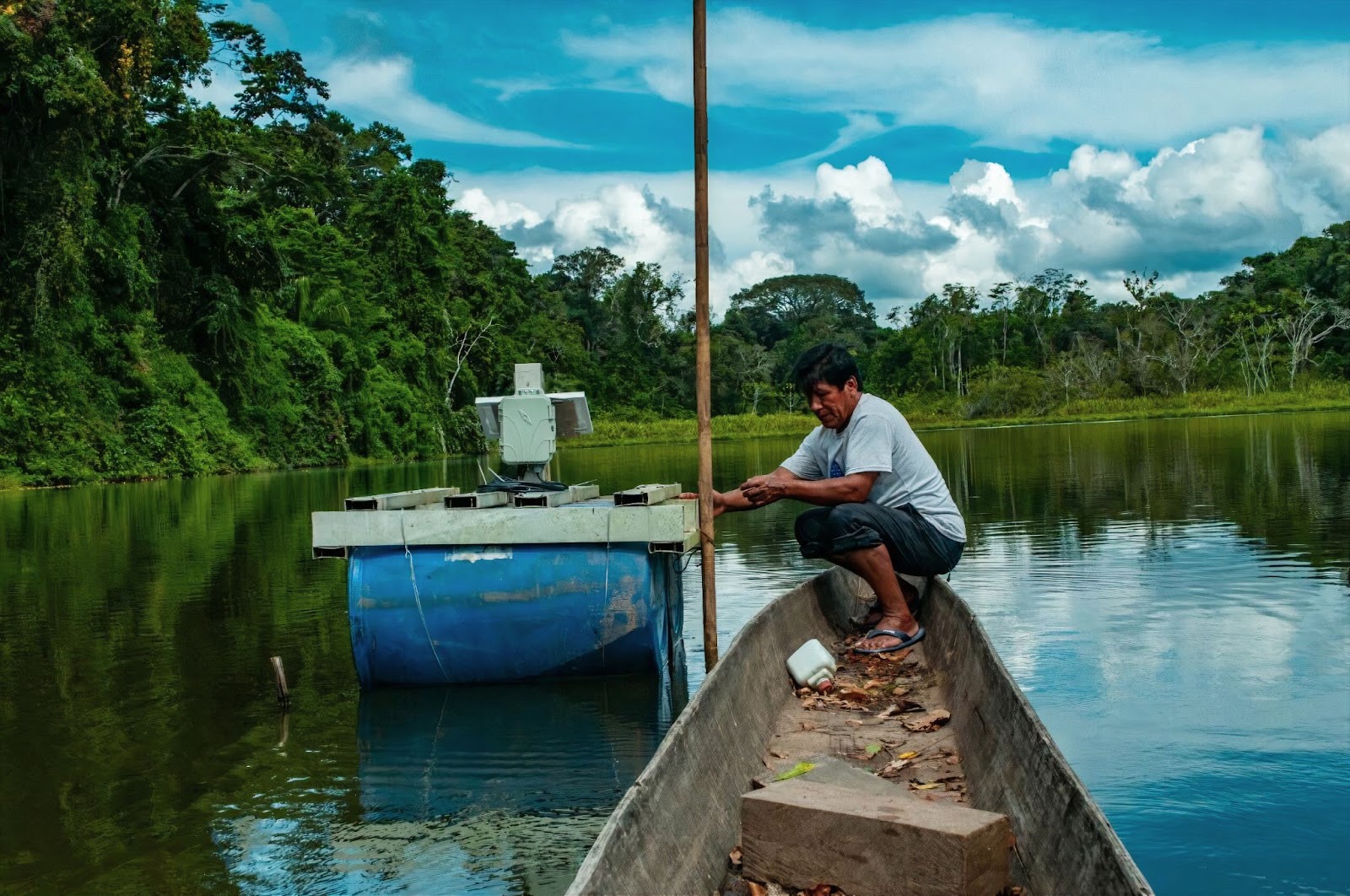This case study in our Conservation Tech Showcase highlights FieldKit, low-cost sensor platform designed to make open source environmental sensing tools accessible and affordable for researchers, citizen scientists, students, and anyone else in the conservation technology field.
About FieldKit

FieldKit is a revolutionary low-cost sensor platform designed to democratize environmental sensing and bring open source scientific monitoring capabilities to a diverse range of users.
The platform is customizable and adaptable to meet the needs of researchers, students, activists, educators, and citizen scientists. FieldKit operates in several countries worldwide, including the USA, Cameroon, Peru, Brazil, Ecuador, Colombia, Bolivia, Sri Lanka, Panama, and Mexico, and has received funding from the National Geographic Society and the Gordon and Betty Moore Foundation.
The platform previously won the 2019 Hackaday grand prize, building a community of over 1,200 engineers, hackers, and collaborators. FieldKit officially launched in 2021 and distributed 50 FieldKit stations for the 50th anniversary of Earth Day in 2020 to projects in 24 countries.
FieldKit is built upon three core components: modular hardware, the FieldKit app, and the FieldKit.org website.
The hardware includes a custom enclosure, dataloggers, communication radios, and sensor modules that can measure various environmental parameters, including temperature, humidity, air quality, and more. Recently, a submersible version of the hardware was developed for marine applications.
The FieldKit app is user-friendly and guides users through the sensor deployment process, allowing them to manage and configure sensors, visualize data, and download it from onboard memory.
And lastly, the website, FieldKit.org, serves as a hub for administration, sensor management, and data visualization, providing interactive and shareable capabilities such as annotation and export functionality.
With these components, FieldKit aims to make environmental monitoring accessible and customizable for individuals and communities, empowering them to advocate for their environment.
FieldKit offers a number of advantages that make it a popular choice for environmental monitoring. Firstly, the FieldKit approach drastically reduces costs, making it possible to deploy more sensors for less money. Additionally, FieldKit stations are designed to withstand harsh field conditions and are built to last. The custom weatherproof enclosure further adds to the station's durability.
Another advantage is modularity, as sensor modules can be easily swapped and mixed to meet specific needs, without the need for proprietary systems that operate with different clocks and interfaces. Furthermore, the FieldKit mobile app and web platform provide an intuitive and user-friendly interface for setting up and managing stations, viewing and analyzing data, and sharing it with team members and the public.
Finally, all of FieldKit's hardware and software is open-source, allowing users to design their own sensor modules or deploy their own versions of the FieldKit platform.
FieldKit's Novel Approach to Environmental Monitoring and its Potential to Revolutionize the Field
FieldKit's approach is novel in that it is not only open source in hardware, firmware, and software, but also modular and extendable, which presents an enormous opportunity to transform environmental sensor development and access to tools in the field.
The current state of environmental monitoring suffers from various shortcomings, including limited spatiotemporal coverage, inaccurate data, and incompatible and decentralized data storage. However, FieldKit's innovative approach enables the simplified combination of different sensor types in a single datalogger package, eliminating the need for multiple systems and data platforms. This has allowed users to create groundbreaking projects in areas such as wildfire detection, heat island monitoring, and measuring impacts from industrial development on the environment.

The potential for FieldKit to continue revolutionizing the field of environmental monitoring is immense. In addition to novel environmental monitoring, FieldKit also emphasizes educating users on deploying and interpreting the collected data. FieldKit has extensive experience in providing education on their system's deployment and use, developing educational materials for curricula ranging from middle school through college. Achieving this requires creating curricula at different levels and providing extensive open documentation, which FieldKit has already started.
Furthermore, FieldKit's team members specializing in hardware, firmware, and software development have extensive experience in the design cycle and data interpretation. The team includes members who can define acceptable uncertainties and support data interpretation, contributing to the larger field of environmental sensing and monitoring with reduced fiscal expenses. This also allows the team to develop solutions for unexpected user needs, such as the flood monitoring project with the Mayor of New York City.
FieldKit's main measure of success is getting its tools into the hands of those who lack access or funding for other currently available sensors and technical tools. The team's work in the Amazon has been a great example of this, with communities and environmental organizations expressing excitement about the opportunities opened up by FieldKit tools. Likewise, the FieldKit Underwater platform has brought marine monitoring capabilities for a tenth of the price of systems used by partner researchers, increasing accessibility.
FieldKit is part of a coalition of organizations providing tools for indigenous causes globally, with plans to increase availability for activists and conservationists in 2022-2023. Collaborations with organizations like NativeLands and Earth Defenders Toolkit also aim to achieve this goal.

FieldKit's Efforts Expand the Reach and Impact of Open-Source Tools for Conservation Technology
FieldKit's commitment to being open source is at the core of their mission to democratize access to conservation technology. Moving from proprietary to open source tools reduces reliance on expensive technology, increases accessibility, and levels the playing field for scientific research. By making all parts of their platform open source, including environmental sensors, app, and FieldKit.org website, the team enables individuals and organizations to collect and share field-based research data and tell stories through interactive visualizations.
The company is even open sourcing their work on manufacturing, business model development, supply chain management, export/fulfillment, and every other aspect of FieldKit. The hope is that other organizations can learn from their approach and adopt the aspects that help them operate better. When the information gathered using conservation technology becomes accessible to everyone, the entire landscape of conservation is transformed.

Environmental sensing and monitoring rely on three approaches: buying expensive equipment or training skilled individuals, which results in a sparse dataset; training volunteers to increase data quantity while retaining high uncertainty; or building one's instrumentation, which requires significant investment and retains issues in hardware, firmware, and software development. FieldKit addresses these challenges with accessible, open-source tools that enable sharing of field-based research data and interactive visualizations, democratizing environmental sensing and monitoring.
FieldKit's commitment to open source extends beyond the environmental sensing and monitoring tools they provide. Part of their work involves resolving technical risks associated with building these tools and then open sourcing the approach to building them. They collaborate with organizations and universities to create their own sensor modules, increasing the accessibility of the tools to all.
With funding, they have been able to take on more risks and opportunities for scale in areas they have not worked in before. FieldKit developed general sensor modules, which allows users to plug in their own sensors, and improved the platform's ability to access existing data sets. They also built tools around their API, enabling users to send FieldKit data into other systems.
These efforts aim to address the challenges in technology development for conservation and expand the reach and impact of FieldKit's open-source tools.

How can I engage with FieldKit?
Join the revolution in environmental sensing by becoming a part of the FieldKit community today! With open-source tools and customizable sensors, you can help advance groundbreaking projects and be a part of the movement to transform the field of environmental monitoring.
Join FieldKit in their mission to empower individuals and communities to advocate for their environment and revolutionize the field of conservation technology.
Explore the 2023 Conservation Tech Showcase
Our new Conservation Tech Showcase is a series exploring successes and bold ideas in the world of conservation technology, shared through case studies about exciting projects from outstanding organizations around the world.
Learn more about the series and its case studies here on WILDLABS.




Add the first post in this thread.